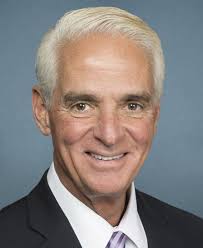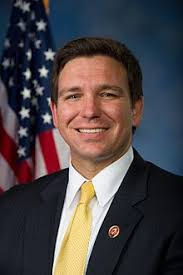When Charlie Crist was Florida’s governor a dozen years ago, he had a good idea that now seems downright radical. He signed executive orders to stave off global warming.
His orders required the state to slash greenhouse gas emissions 80 percent by 2050 and mandated that utilities get 20 percent of their electricity from renewable fuels. State-owned buildings needed to be energy-efficient, he said, and Florida’s fleet needed to run on clean-burning fuel such as ethanol.
We haven’t heard about those targets in quite a while. That’s because Rick Scott rolled them back in 2012, just over a year into his first term as governor.

Where the then-Republican Crist had made global warming a priority, Scott became a late-night-comedian famous for reportedly banning the phrase. Scott was hell-bent on lifting environmental regulations, which he thought were brakes on a recession-stalled economy.
But the economy has recovered and Florida has a new governor, Ron DeSantis, who would like to be thought of as Teddy Roosevelt-style environmentalist.
Here’s a tip for him: Bring back those targets, or something like them. They’re needed. The climate is in crisis.
And it’s playing out in Florida in concrete ways.
On Wednesday, the county sustainability officer for the Florida Keys released a study showing that the cost to taxpayers of elevating a single three-mile road was so high ($75 million to keep it dry year-round in 2025; $181 million to keep beyond the reach of floods in 2060), that the county shouldn’t do it.
These are hard choices, and they don’t exclude that dreaded word, “retreat.”
“As much as we love the Keys,” said Rhonda Haag, the Monroe County official, “there’s going to be a time when it’s going to be less population.”
What is true of the low-elevation Keys will soon enough be true of other parts of the state.
In Madrid, meanwhile, UN Secretary-General Antonio Guterres is warning that the world’s effort to avert the worst has been “utterly inadequate.”
“The point of no return is no longer over the horizon,” Guterres said on the eve of a two-week international climate conference. “It is in sight and hurtling toward us.”
There’s no big secret about how to slow the runaway pace of global warming. “We simply have to stop digging and drilling and take advantage of the vast possibilities offered by renewable energy and nature-based solutions,“ Guterres said.
“What is lacking is political will.”
That’s exactly right. We should be making significant changes in our ways — and too many politicians owe the financing of their careers to the industries that benefit from the status quo.
In DeSantis’ Republican Party especially, all but a handful are acting as though there is utterly no connection between the avid consumption of fossil fuel and the fact that the world is nearing the end of the hottest decade in history.

The world’s oceans, which absorb 90% of the excess heat produced by greenhouse gases, are now at their highest recorded temperatures, says the World Meteorological Organization.
The AFP news agency reports: “The world’s seas are now a quarter more acidic than 150 years ago, threatening vital marine ecosystems upon which billions of people rely for food and jobs.
“In October, the global mean sea level reached its highest on record, fueled by the 329 billion tons of ice lost from the Greenland ice sheet in 12 months.
“Each of the last four decades has been hotter than the last.”
And carbon emissions are still rising.
To avoid marching to certain disaster, we need leadership — leadership conspicuously missing from the Trump administration, which has spitefully pulled out of the Paris Accord and sent no senior members to the Madrid conference, which is trying to agree on rules for implementing the Paris goals of limiting temperature rises to between 2.7 and 3.6 degrees Fahrenheit above pre-industrial levels.
It all creates a perfect opportunity for DeSantis to make a mark. With an approval rating higher than any Florida governor in years, he is perfectly situated to undertake the heavy lift of putting the state on a saner course while absorbing the inevitable hits from the inevitable critics.
Our state, after all, ranks third in U.S. carbon dioxide emissions, according to the U.S. Energy Information Administration, behind only Texas and California.
We must change our ways. Millions of us know it.
If the governor dares to set limits on fossil-fuel consumption, if he dares set a historic new course aimed at ensuring our state’s survival, millions of us will gladly follow.
“The Invading Sea” is the opinion arm of the Florida Climate Reporting Network, a collaborative of news organizations across the state focusing on the threats posed by the warming climate.



